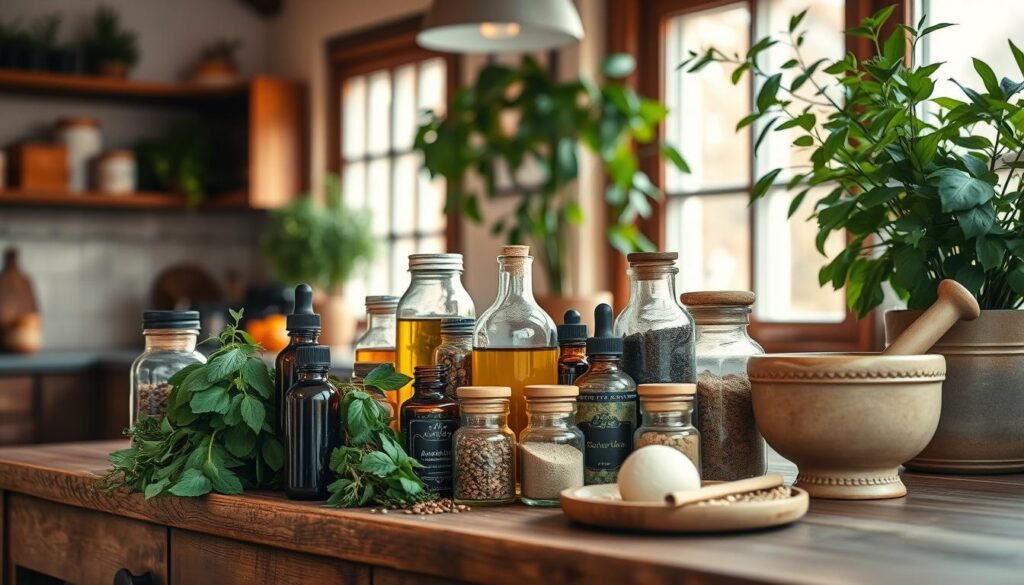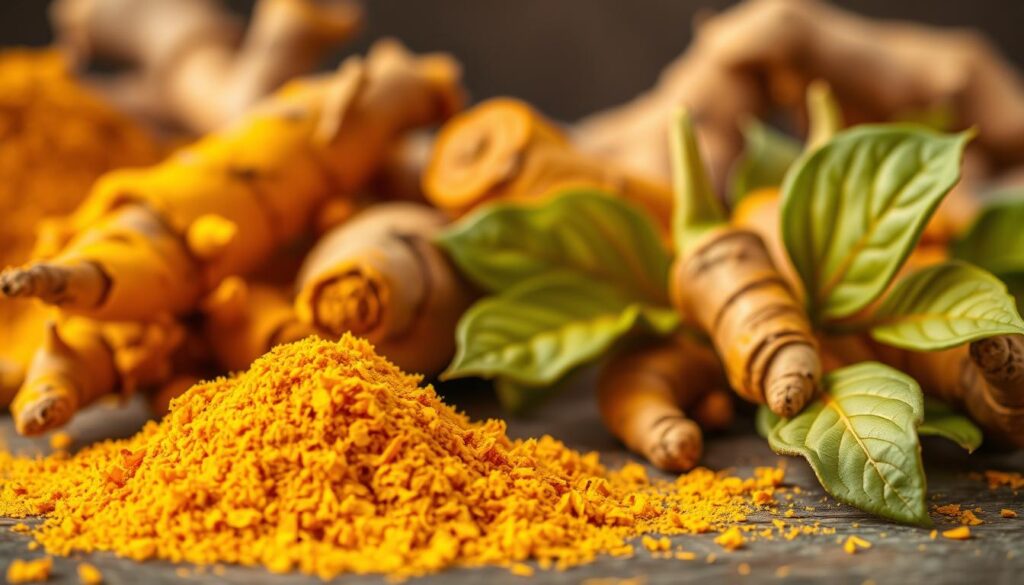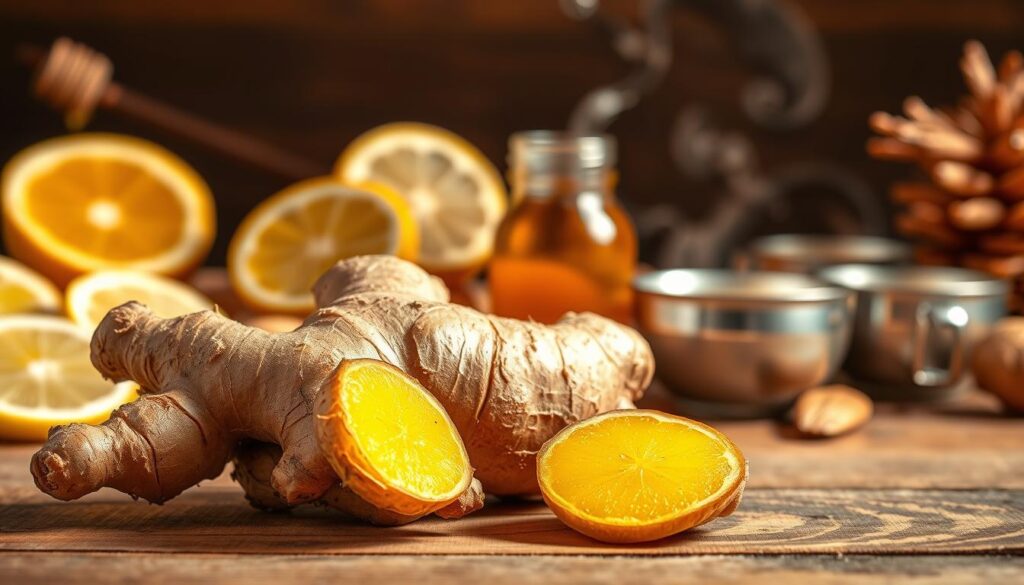5 Common Household Ingredients That Double as Natural Cures
Discover the power of simple, effective solutions to common health issues. You likely already have these ingredients at your disposal.
For centuries, people have used home remedies to fix various health problems. These remedies can soothe a sore throat or calm a stomachache. Their beauty is in their simplicity and easy access.
Using natural ingredients from your pantry or fridge is a smart move. It’s a cost-effective and efficient way to care for your health.
Key Takeaways
- Common household ingredients can be used as effective natural cures.
- These remedies are often simple, cost-effective, and easy to prepare.
- Natural ingredients can help alleviate various health issues.
- Using these remedies can be a great way to take care of your health without relying on pharmaceuticals.
- You likely already have many of these ingredients in your pantry or fridge.
The Power of Kitchen Remedies
Kitchen cures are a simple and affordable way to handle common health issues. For ages, people have used home items to stay healthy. These natural remedies work well and are easy to find.
Why Natural Cures Are Gaining Popularity
More people are turning to natural cures because they don’t trust harsh chemicals in commercial products. They want something kinder to their bodies and the planet. Plus, using what you already have at home saves money.
The Science Behind Kitchen Ingredients as Medicine
Many kitchen items have been shown to have healing powers. Honey fights bacteria, and turmeric has a strong anti-inflammatory. Knowing how these ingredients work can help us use them for better health.
| Ingredient | Medicinal Property | Common Use |
|---|---|---|
| Honey | Antibacterial | Sore throat relief |
| Turmeric | Anti-inflammatory | Pain management |
| Ginger | Digestive aid | Nausea relief |
By learning about and using these kitchen cures, we can take charge of our health. We can use natural ingredients to live a healthier life.
Understanding Home Remedies and Their Benefits
Our kitchens hold natural ingredients that can treat common ailments. This method saves money and promotes a healthier lifestyle. It also reduces exposure to harsh chemicals.
Cost-Effective Alternatives to Commercial Products
Using home remedies can lower healthcare costs. Many natural ingredients are found at home. They are cheaper than commercial products.
| Commercial Product | Home Remedy | Cost Savings |
|---|---|---|
| Cough Syrup | Honey and Lemon | Up to 50% less |
| Skin Cream | Coconut Oil | Up to 30% less |
Reducing Chemical Exposure in Your Wellness Routine
Choosing natural ingredients lowers chemical exposure. Health experts say, “Reducing chemical exposure is key to a healthier life.”
“The best way to maintain health is to use natural remedies that have been passed down through generations.”

Honey: Nature’s Golden Healer
Honey is more than a tasty treat; it’s a powerful natural healer. For ages, people have used honey for its health benefits. It’s a key part of many home remedies.
Nutritional Profile and Medicinal Properties
Honey is packed with antioxidants, vitamins, and minerals. These nutrients help fight off bacteria and fungi. It’s great for treating many health problems, from stomach issues to skin troubles.
Nutritional Components of Honey:
| Component | Benefit |
|---|---|
| Antioxidants | Protects against cell damage |
| Vitamin C | Boosts immune system |
| Flavonoids | Anti-inflammatory properties |
Treating Sore Throats and Respiratory Issues
Honey is a top choice for soothing sore throats and coughs. Its smooth texture covers the throat, easing pain. Its antibacterial properties also fight off infections.
To make a simple cough syrup, mix equal parts honey and lemon juice. This mix not only calms the throat but also adds vitamin C.
Wound Healing Applications
Honey’s antibacterial properties make it great for healing wounds. It keeps the wound moist, helping it heal faster and preventing infection.
DIY Honey Remedies for Common Ailments
Honey is versatile in DIY remedies. For example, mixing it with yogurt and oatmeal makes a face mask for skin irritations.
- Mix honey with warm water for a sore throat gargle.
- Combine honey and cinnamon for a paste to treat acne.
- Use honey as a natural sweetener in teas for digestive issues.
Adding honey to your daily life can help with many health problems. It’s a natural way to improve your well-being.
Apple Cider Vinegar: The Versatile Tonic
Apple cider vinegar has been used for health for centuries. It’s full of wellness hacks for today’s life. This tonic helps with digestion and skin care. Let’s look at why ACV is good and how to use it every day.
Understanding ACV’s Healing Components
Apple cider vinegar has acetic acid, which is key to its health benefits. It also has potassium and antioxidants. Plus, unfiltered ACV has probiotics for better gut health.

Digestive Health Benefits
Apple cider vinegar is great for your stomach. It can ease indigestion and bloating. Mix 1 tablespoon with water and drink it before meals.
Skin and Hair Care Applications
ACV is also good for your skin and hair. It balances your skin’s pH, fighting acne. For hair, use it as a final rinse to add shine and fight dandruff.
How to Prepare ACV Remedies Safely
When using ACV, mix it with water. Undiluted ACV can be too harsh. Start small and increase as needed. Always talk to a doctor before big changes in your routine.
Adding apple cider vinegar to your home remedies can boost your health naturally.
Coconut Oil: Multi-Purpose Healing Oil
Coconut oil is packed with nutrients and is known for its healing powers. It has been used for centuries in many cultures. People use it for skin care and even oral health.

Nutritional Breakdown and Medicinal Properties
Coconut oil is full of medium-chain triglycerides (MCTs), like lauric acid. Lauric acid fights off germs. This makes coconut oil good for fighting inflammation and protecting against damage.
Key Nutritional Components:
- Medium-chain triglycerides (MCTs)
- Lauric acid
- Capric and caprylic acid
Skin Conditions It Can Address
Coconut oil is great for the skin. It moisturizes and fights off germs. It helps with:
- Dry skin and eczema
- Wound healing
- Anti-aging
Oral Health Applications
Oil pulling with coconut oil is good for your mouth. It helps with:
- Reducing plaque and gingivitis
- Freshening breath
- Supporting overall oral hygiene
DIY Coconut Oil Treatments for Daily Use
It’s easy to make your own coconut oil treatments. Here are some ideas:
- Mixing coconut oil with sugar or salt for a natural exfoliating scrub
- Using coconut oil as a hair mask to nourish and moisturize
- Combining coconut oil with essential oils for a soothing massage oil
Adding coconut oil to your daily routine can improve your health and wellness.
Turmeric: The Golden Spice of Wellness
Turmeric is more than a spice; it’s a wellness hack. For ages, it’s been key in traditional medicine, known for its healing powers. At its core is curcumin, a compound with strong medicinal effects.
Understanding Curcumin and Its Benefits
Curcumin is turmeric’s active part, giving it its bright yellow color and health perks. It fights inflammation and protects against damage, making it great for home remedies. Studies show it can manage long-term inflammation, linked to many diseases.

Anti-Inflammatory Applications
Curcumin’s biggest plus is its fight against inflammation. Long-term inflammation is tied to diseases like arthritis and heart issues. Adding turmeric to your meals can help lower these risks.
Immune System Support
Turmeric boosts the immune system too. Its antioxidants battle free radicals, boosting the body’s defenses. Drinking turmeric regularly can make your immune system stronger.
Preparing Effective Turmeric Remedies
To get turmeric’s benefits, prepare it right. Making a turmeric tea or golden milk is a good start. Mix turmeric powder with warm milk or water. A bit of black pepper boosts curcumin’s effect.
Adding turmeric to your daily life is a simple yet effective wellness hack. It can greatly improve your health and wellbeing, whether in cooking or as a supplement.
Ginger: The Warming Digestive Aid
Ginger is a key ingredient in many kitchens. It helps with nausea and reduces inflammation. For centuries, it has been used in traditional medicine for many health problems.

Active Compounds and Their Effects
Ginger’s health benefits come from compounds like gingerol, shogaol, and paradol. These help fight inflammation, protect against damage, and soothe the stomach. Ginger’s active parts improve many body functions, making it great for health.
Nausea and Digestive Relief
Ginger is famous for easing nausea and stomach pain. It works well for pregnant women and those getting chemotherapy. It also helps with bloating, cramps, and indigestion.
Anti-Inflammatory Benefits
Ginger is also great for fighting inflammation. Its compounds stop the body from making harmful chemicals. Eating ginger regularly can help with arthritis and other inflammation-related issues.
Easy Ginger Preparations for Common Ailments
Adding ginger to your day is easy. There are many ways to use it:
- Making ginger tea by steeping fresh ginger in hot water
- Adding fresh or dried ginger to meals for an extra health boost
- Consuming ginger in capsule or supplement form for a concentrated dose
- Using ginger essential oil in aromatherapy or topical applications (diluted with a carrier oil)
Using ginger can help with digestion, reduce inflammation, and improve overall health.
Safety Considerations When Using Natural Ingredients
Exploring natural remedies is exciting, but safety comes first. These ingredients are usually safe, but we need to be careful. This ensures they work well and safely.
Potential Allergies and Sensitivities
Natural ingredients can cause allergies or sensitivities in some people. For example, honey might trigger reactions in those allergic to bee pollen. Always check for any allergies before trying new remedies.
- Perform patch tests for skin applications.
- Start with small amounts when ingesting new remedies.
- Monitor your body’s reaction closely.
When to Consult a Healthcare Professional
Many natural remedies are safe, but sometimes, it’s best to talk to a doctor. This is true for pregnant or breastfeeding women, people with chronic health issues, or those on medication. A doctor can help with safe use and any possible interactions.
Proper Storage of Natural Remedies
Keeping natural remedies safe and effective means proper storage. Store them away from sunlight, moisture, and heat. For instance, coconut oil can spoil if not stored right.

By keeping these safety tips in mind, you can safely enjoy natural ingredients. Adding these habits to your wellness routine can boost your health and happiness.
Popular Kitchen Cures and Home Remedies for Common Ailments
Your kitchen is full of ingredients that can help with many health problems. These kitchen cures have been around for centuries. They offer relief without the need for medicines.
Headache and Pain Relief Solutions
For headaches, try using ginger. It has anti-inflammatory properties that ease pain. You can make ginger tea by steeping fresh ginger in hot water or use ginger powder.
Another good remedy is a cold or warm compress. Putting it on your forehead or neck can ease tension and reduce headaches.
Digestive Discomfort Remedies
Apple cider vinegar is great for digestive problems. Mixing a tablespoon with water can help with indigestion and bloating.
Turmeric also helps with digestive issues. Its anti-inflammatory properties can ease symptoms of irritable bowel syndrome (IBS).
| Remedy | Ailment | Preparation |
|---|---|---|
| Ginger Tea | Headache | Steep fresh ginger in hot water |
| Apple Cider Vinegar | Digestive Issues | Mix 1 tablespoon with water |
| Turmeric Milk | Digestive Discomfort | Mix turmeric powder with warm milk |
Skin Issue Treatments
Coconut oil is great for the skin. It moisturizes, reduces inflammation, and helps wounds heal.
Honey is also good for the skin. It has antibacterial properties that help with acne and minor cuts.

These kitchen cures are natural and often work well for common problems. By using them daily, you can improve your health and wellbeing.
Creating Your Natural Medicine Cabinet with Wellness Hacks
Building a natural medicine cabinet is easy and boosts your wellness. Stock up on key natural ingredients and learn how to use and store them. This way, you’ll have many home remedies ready to go.
Essential Ingredients to Keep on Hand
You’ll need a few important ingredients to begin. Honey is great for fighting bacteria, turmeric helps with inflammation, and ginger is good for your stomach. Don’t forget coconut oil for your skin and hair, and apple cider vinegar for many health uses.
| Ingredient | Uses |
|---|---|
| Honey | Sore throat relief, wound healing |
| Turmeric | Anti-inflammatory, immune support |
| Ginger | Digestive aid, nausea relief |
Proper Preparation and Storage Methods
After getting your ingredients, it’s key to prepare and store them right. Honey should be kept in a cool, dry spot. Turmeric needs to be in an airtight container to keep its strength.
Seasonal Remedy Planning
Plan your remedies by season to tackle common issues. In winter, use turmeric and ginger tea to boost your immune system.

Conclusion
Throughout this article, we’ve seen how common household items can cure many ailments. Using these kitchen cures daily can help you stay healthy and well.
Honey’s antibacterial properties and turmeric’s anti-inflammatory effects are just a few examples. These natural ingredients can greatly improve your health. Learning how to use them safely and right can help you avoid commercial products.
Adding natural ingredients to your daily routine is a great step towards better health. Start using kitchen cures today and see the benefits of natural ingredients for yourself.






